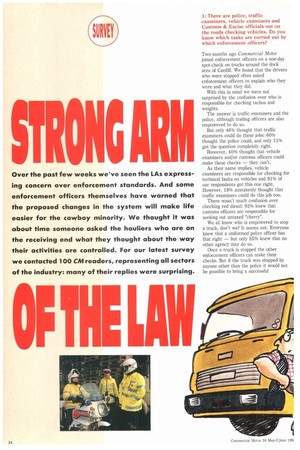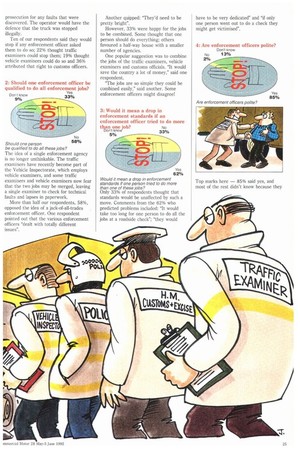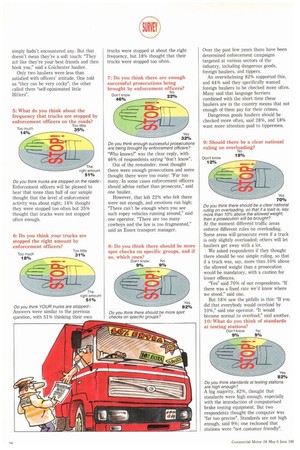Over the past few weeks we've seen the LAs expressing
Page 26

Page 27

Page 28

If you've noticed an error in this article please click here to report it so we can fix it.
concern over enforcement standards. And some enforcement officers themselves have warned that the proposed changes in the system will make life easier for the cowboy minority. We thought it was about time someone asked the hauliers who are on the receiving end what they thought about the way their activities are controlled. For our latest survey we contacted 100 CM readers, representing all sectors of the industry: many of their replies were surprising.
Two months ago Commercial Motor joined enforcement officers on a one-day spot-check on trucks around the dock area of Cardiff. We found that the drivers who were stopped often asked enforcement officers to explain who they were and what they did.
With this in mind we were not surprised by the confusion over who is responsible for checking tachos and weights.
The answer is traffic examiners and the police, although trading officers are also empowered to do so.
But only 46% thought that traffic examiners could do these jobs: 60% thought the police could, and only 11% got the question completely right.
However, 40% thought that vehicle examiners and/or customs officers could make these checks — they can't.
As their name implies, vehicle examiners are responsible for checking for technical faults on vehicles and 81% of our respondents got this one right. However, 19% mistakenly thought that traffic examiners could do this job too.
There wasn't much confusion over checking red diesel: 92% knew that customs officers are responsible for seeking out untaxed "cherry".
We all know who is empowered to stop a truck, don't we? It seems not. Everyone knew that a uniformed police officer has that right — but only 55% knew that no other agency may do so.
Once a truck is stopped the other enforcement officers can make their checks. But if the truck was stopped by anyone other than the police it would not be possible to bring a successful prosecution for any faults that were discovered. The operator would have the defence that the truck was stopped illegally.
Ten of our respondents said they would stop if any enforcement officer asked them to do so; 22% thought traffic examiners could stop them; 19% thought vehicle examiners could do so and 36% attributed that right to customs officers.
Should one person be qualified to do all these jobs?
The idea of a single enforcement agency is no longer unthinkable. The traffic examiners have recently become part of the Vehicle Inspectorate, which employs vehicle examiners, and some traffic examiners and vehicle examiners now fear that the two jobs may be merged, leaving a single examiner to check for technical faults and lapses in paperwork.
More than half our respondents, 58%, opposed the idea of a jack-of-all-trades enforcement officer. One respondent pointed out that the various enforcement officers "dealt with totally different issues". Another quipped: "They'd need to be pretty bright".
However, 33% were happy for the jobs to be combined. Some thought that one person should do everything; others favoured a half-way house with a smaller number of agencies.
One popular suggestion was to combine the jobs of the traffic examiners, vehicle examiners and customs officials. "It would save the country a lot of money," said one respondent.
"The jobs are so simple they could be combined easily," said another. Some enforcement officers might disagree!
Would it mean a drop in enforcement standards if one person tried to do more than one of these jobs?
Only 33% of respondents thought that standards would be unaffected by such a move. Comments from the 62% who predicted problems included: "It would take too long for one person to do all the jobs at a roadside check"; "they would have to be very dedicated" and "if only one person went out to do a check they might get victimised".
Top marks here — 85% said yes, and most of the rest didn't know because they simply hadn't encountered any. But that doesn't mean they're a soft touch: "They act like they're your best friends and then book you," said a Colchester haulier.
Only two hauliers were less than satisfied with officers' attitude. One told us "they can be very cocky"; the other called them "self-opinionated little Hitlers".
Do you think trucks are stopped on the roads:Enforcement officers will be pleased to hear that more than half of our sample thought that the level of enforcement activity was about right; 14% thought they were stopped too often but 35% thought that trucks were not stopped often enough.
Do you think YOUR trucks are stopped:Answers were similar to the previous question, with 51% thinking their own
trucks were stopped at about the right frequency, but 18% thought that their trucks were stopped too often.
Do you think enough successful prosecutions are being brought by enforcement officers? "Who knows?" was the clear reply, with 46% of respondents saying "don't know".
Out of the remainder, most thought there were enough prosecutions and some thought there were too many: "Far too many. In some cases enforcement officers should advise rather than prosecute," said one haulier.
However, that left 22% who felt there were not enough, and emotions ran high: "There can't be enough when you see such ropey vehicles running around," said one operator. "There are too many cowboys and the law is too fragmented," said an Essex transport manager. Over the past few years there have been determined enforcement campaigns targeted at various sectors of the industry, including dangerous goods, foreign hauliers, and tippers.
An overwhelming 82% supported this, and 44% said they specifically wanted foreign hauliers to be checked more often. Many said that language barriers combined with the short time these hauliers are in the country means that not enough of them pay for their crimes.
Dangerous goods hauliers should be checked more often, said 28%, and 18% want more attention paid to tippermen.
Do you think there should be a clear national ruling on overloading, so that if a load is, say, more than 10% above the allowed weight, then a prosecution will be brought?
At the moment different traffic areas enforce different rules on overloading. Some areas will prosecute even if a truck is only slightly overloaded; others will let hauliers get away with a lot.
We asked respondents if they thought there should be one simple ruling, so that if a truck was, say, more than 10% above the allowed weight than a prosecution would be mandatory, with a caution for lesser offences.
"Yes" said 70% of our respondents. "If there was a fixed rate we'd know where we stood." said one.
But 18% saw the pitfalls in this: "If you did that everybody would overload by 1096," said one operator. "It would become normal to overload," said another.
Do you think standards at testing stations are high enough?
A big majority, 82%, thought that standards were high enough, especially with the introduction of computerised brake testing equipment. But two respondents thought the computer was "far too precise". Standards are not high enough, said 9%; one reckoned that stations were "not customer friendly'.




















































































